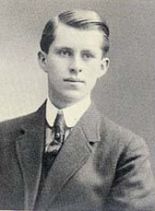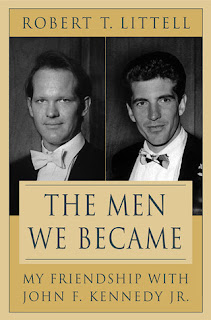On 17 December, 2012, David Nasaw (author of The Patriarch: The Remarkable Life and Turbulent Times of Joseph P. Kennedy) dismissed on Chicago Tonight (Chicago Public Television) the myth of Joe Kennedy's alleged bootlegging. In another interview with NPR, Nasaw explains with detail his complex subject: "Joseph P. Kennedy was a man of boundless talents, magnetic charm, relentless energy, and unbridled ambition. His life was punctuated by meteoric rises, catastrophic falls, and numerous rebirths, by cascading joys and blinding sorrows, and by a tragic ending which was Shakespearean in its pathos. An Irish Catholic from East Boston, Joe Kennedy was proud of his heritage but refused to be defined by it. He fought to open doors that were closed to him, then having forced his way inside, he refused to play by the rules. He spoke his mind — when he should not have. Too often, he let his fears speak for him. He was distrustful, often contemptuous of those in power — and did not disguise it. His anger and his hatreds were legendary, especially at those whom he believed had betrayed him. Joseph Kennedy had wanted to exert his influence in a positive way. His children entered public service with verve and single-mindedness because that was what he raised them to do. He told his children over and over again, 'I'm making all this money so you don't have to make money, so that you can go into public service. He impressed on them that those who are privileged with money, with education, with good looks, have to give something back to those who don't have those privileges, and he truly believed that," Nasaw tells NPR: "And all of these kids grew up knowing they were not going to go into business. They didn't want to go into business. They were going to do some sort of public service and, in the end, they did."
"On graduation, he crossed to Cambridge and Harvard College, where he found himself for the first time in his life the odd man out. It was only when he graduates from Harvard that he begins to understand what it means to be an Irish Catholic from East Boston, whose father is a local ward leader. He wants to go into banking or finance. He cannot get a job. Cannot get an interview. His friends, who happen to be Protestant with the same degree that he has and not as good a head for numbers as he has, they have no problem getting jobs. So it's at that moment in 1912 that he realizes — really for the first time — that there are going to be a lot of doors closed to him, and only because he is Irish Catholic in Boston." By the time Joe Kennedy left college, he knew who he was: the smartest man in the room, the one who would come out ahead in every negotiation he entered into. His ambition was to secure a place in a major Boston bank or financial house, but such positions, he discovered on graduation from Harvard, were reserved for "proper Bostonians," not the sons of East Boston Irish Catholic ward leaders. He made the best of the situation by getting a civil service job as the youngest assistant bank examiner at age 25."
"During the 1920s, Joe Kennedy was a major player in the nation's fastest growing industry, moving pictures, and one of the few Irish Catholics to own or run a studio. The Hollywood he encountered was not a dream factory. It was a town and an industry focused on raising funds to finance the transition to sound and organizing itself to repel attempts at censorship. Kennedy arrived as the head of a minor debt-ridden studio and positioned himself as a non-Jewish white knight who would rescue the industry from those who questioned its taste and its morals. He promised to apply a banker's good sense to making pictures: to cut production costs, raise studio profits, and boost share prices. His rise was meteoric, but after only a few years in the industry, he retired — with Gloria Swanson as his long time mistress and millions of dollars in stock options."
"Trusting no one, with no allegiance to any industry or firm or producer, he made a fortune in Hollywood by selling RKO to Howard Hughes and then in New York, buying and selling options, stocks, and bonds to the companies with which he was associated. A multimillionaire by the age of forty, his outlook on the world was transformed in the early years of the Depression from one of hopeful expectation to an almost unshakeable pessimism. His fears for the future of capitalism after the Depression deepened and prompted him to abandon the private sector in 1932 to campaign for Franklin Roosevelt's election as president. A conservative banker and stock trader with no experience in national politics, he was the odd man out on the campaign trail and, later, in New Deal Washington. Few government appointments have been as universally condemned as was President Roosevelt's choice of Joseph P. Kennedy, a Wall Street operator, to be the first chairman of the Securities and Exchange Commission in 1934. And few were as universally acclaimed as Kennedy's was within months of his assuming his post. His years in Washington as chairman of the SEC, then chairman of the Maritime Commission, were marked by triumph, his reputation as a truth-telling nonpartisan with analytical approach enhanced to the point where he was prominently mentioned as a possible presidential candidate."
"Joe Kennedy was rewarded for his service in Washington with appointment as ambassador to the Court of St. James's. The first Irish American to be named to London, with no experience whatsoever to prepare him for the post, he was an outsider again, but this time he reveled in it. He returned to Washington in disgrace. He tried to be of service to his country after Pearl Harbor, but there was no place for him in the Roosevelt administration that he believed worthy of his talents. In the postwar period, his pessimism became more corrosive still, as did his conviction that he had been right all along to oppose the war against the dictators. He stridently, proudly, renewed his calls for appeasement, this time of the Soviet Union, and for isolation from rather than engagement in the world outside the western hemisphere, and did all he could to provoke a "great debate" on the wisdom of fighting a cold war that, he feared, might turn hot at any moment. He took his role as the parent of nine seriously. He was an active, loving, attentive, sometimes intrusive father. He pushed his children forward, giving them good advice whether they solicited it or not, gently chided them to do better, and taught them that family was sacred."
"Joe Kennedy raised his kids to be as confident and as stubborn as he was, and as relentlessly optimistic as he was pessimistic — and, for the most part, they were. One cannot help but admire a man who from such humble origins back to Dunganstown (Ireland) became so wealthy, powerful and politically influential. This most articulate, most dominant man, in December of 1961 — less than a year into his son's first term as president — has a massive stroke. They perform the last rites. Nobody thinks he'll last more than 24 hours; he lasts eight years. But during those eight years, he is unable to communicate through language. He can't write, he can't speak, though he seems to understand everything he's told. And it is during those eight years that he witnesses the assassinations—the violent deaths—of his second and his third sons. An unimaginable horror after another. And there's no way for him to express his feelings except to sob. And he cries and he suffers, but he knows it won't bring back those lost sons." Source: www.npr.org
Robert T. Littell: John and I shared similarities that connected us quickly. My grandfather was an old-line WASP from Barrington Hills, Illinois, where he’d made his name and fortune in banking, the same than John's grandfather Joe Sr. We had both turbulent childhoods and emerged with the confidence of survivors. Neither of us could we really talk about our fathers’ deaths. We’d been raised by strong-willed mothers and brainy sisters. And we shared a belief in our own future greatness. My big Teflon-coated ego was an important part of our fast friendship. Irreverent and cocky, I believed that I was John’s equal or better. I can’t explain this and don’t defend it; it’s just the way I was then. And John liked it. We found our friendship easy. From the start, we were each other’s best audience. We each knew the other to be hilarious, brave, and brilliant. That’s one of the key conditions for male bonding—deep, unconditional admiration. Add a constant stream of well-intentioned jokes and you’ve got the recipe for a great friendship.
On one hand, John was the only son of the most accomplished member of a very prominent, accomplished clan like the Kennedys were. John was also, without question, the media’s favorite Kennedy: the “sexiest” one, the one who never got in trouble. On the other hand, John was something of an outsider within the Kennedy family. Though very close to Anthony Radziwiłł, and close to several of his cousins, especially Bobby Kennedy Jr., Timmy Shriver and Willie Smith, John had a slightly strained relationship with the tight-knit crew as a whole. He’d been raised outside of their Massachusetts world, kept apart by his protective and New York–based mother. She saw to it that her children were as independent as she was. It wasn’t long after our game that Jackie took the decision of occupy her own home on Martha’s Vineyard—close to the family, but still separate. The Hyannis Port gang teased John not for lack of love but, in my opinion, out of envy. This didn’t bother him a bit. He had the best of two worlds and he knew it. He could be tough when someone trespassed his boundaries, but in essence he was a sweet, compassionate and generous friend.
When John had to introduce Carolyn officially to the Kennedy clan, I was convinced she was going to have difficulties in adjusting that tense, suffocating atmosphere in Hyannis Port. I know Ethel Kennedy and Eunice Shriver tried hard to implicate her in the family activities, but Carolyn was seen as this modern, non-traditional young woman who didn't conform to the typical Kennedy wife in many aspects. John was a monogamous and loyal guy. Frankly, his loyalty with his friends was the same than his loyalty with his girlfriends. I know first hand he had many skirts thrown at him, but with women he was quite innocent, he was very innocent on that level. He even had blocked Madonna's advances. John gave me a very funny account of himself and Madonna stuck in a hotel room in Chicago, saying to the Material Girl he hadn't brought condoms, that was the excuse he used to stiff her. On another occasion, he gave Melanie Griffith a fake phone number, for Christ sake! I suppose some journalists would have liked to paint John as more of a playboy, or more of a Kennedy or more mysterious, but frankly he was rather transparent and I believe he stuck to his vows with Carolyn. —The Men We Became: My Friendship with John F. Kennedy, Jr. (2004) by Robert T. Littell






















No comments :
Post a Comment